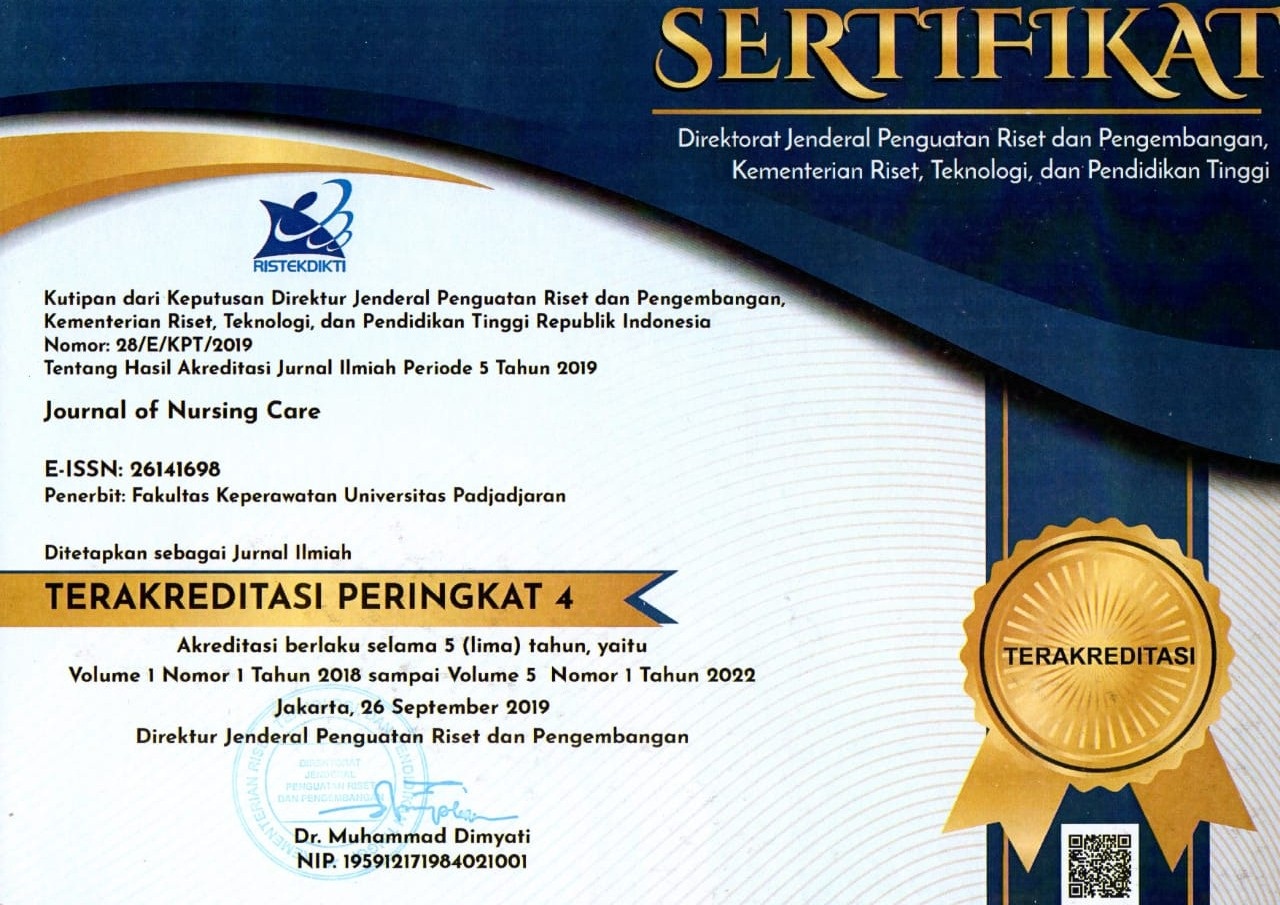Relationship Between Parents' Education and Income Level with Personal Hygiene Practices in Under-Five Children Care
Abstract
Poor personal hygiene practices can affect the incidence of infectious diseases which in turn can increase the risk of stunting. Several factors influence the practice of personal hygiene in the care of under-five children, namely the level of education and income of parents. The research was to analyze the relationship between parents' education and income level with personal hygiene practices in under-five children's care. The research design is a quantitative correlation with secondary data sources. The population is parents who have under-five children in Sukamulya Village, Bandung. Samples were taken using an accidental sampling technique with a total of 85 respondents, excluding parents whose children died in the under-five age range or whose children were 5 years old at the time of data collection. The instrument is a questionnaire consisting of demographic data and 7 questions related to personal hygiene practices in caring for under-five children. The data were analyzed using the Spearman test. The results showed that there was no relationship between the educational (p-value=0.16) and income (p-value=0.887) level of parents with personal hygiene practices in caring for under-five children in Sukamulya Village, Bandung. The next research suggestion is to examine other factors that influence personal hygiene practices in caring for under-five children.
Keywords
Full Text:
PDFReferences
Aisah, S., Ngaisyah, R. D., & Rahmuniyati, M. E. (2019). Personal Hygiene Dan Sanitasi Lingkungan Berhubungan dengan Kejadian Stunting di Desa Wukirsari Kecamatan Cangkringan. Prosiding Seminar Nasional Multidisiplin Ilmu, 1(2), 49–55. Retrieved from http://prosiding.respati.ac.id/index.php/PSN/article/download/182/176
Arina, M. R. D. (2022). Hubungan Praktik Pola Asuh Ibu dengan Kejadian Stunting pada Balita Usia 24-59 Bulan (Studi di Desa Lokus Stunting Wilayah Kerja Puskesmas Kotaanyar Kabupaten Probolinggo). Universitas Jember.
Badan Litbangkes Kemenkes RI. (2021). Buku Saku Hasil Studi Status Gizi Indonesia (SSGI) Tahun 2021. Retrieved from https://www.litbang.kemkes.go.id/buku-saku-hasil-studi-status-gizi-indonesia-ssgi-tahun-2021/
Bella, F. D., Fajar, N. A., & Misnaniarti. (2019). Hubungan pola asuh dengan kejadian stunting balita dari keluarga miskin di Kota Palembang. Jurnal Gizi Indonesia, 8(1), 31–39.
Burhani, P. A., Oenzil, F., & Revilla, G. (2016). Hubungan Tingkat Pengetahuan Ibu dan Tingkat Ekonomi Keluarga Nelayan dengan Status Gizi Balita di Kelurahan Air Tawar Barat Kota Padang. Jurnal Kesehatan Andalas, 5(3), 515–521. https://doi.org/10.25077/jka.v5i3.569
Djuhaeni, H. (2015). Peran Perawat Dalam Pembinaan Keluarga Sejahtera. Retrieved from https://pustaka.unpad.ac.id/archives/25631
Edyati, L. (2014). Pengaruh Penyuluhan Kesehatan dengan Media Video terhadap Pengetahuan dan Sikap Personal Hygiene Siswa SD Negeri 1 Kepek Pengasih Kulon Progo (STIKES ’Aisyiah). STIKES ’Aisyiah. Retrieved from http://digilib.unisayogya.ac.id/378/1/NASKAH PUBLIKASI LULUQ EDYATI 201010201050.pdf
Furkon, L. A., Rahmawati, S. M., Ratnaningrum, A., Jamaludin, Picauly, I., Nurhayati, A. I., … Ekawidyani, K. R. (2016). Ilmu Gizi dan Kesehatan. Tangerang Selatan: Universitas Terbuka.
Goudet, S. M., Bogin, B. A., Madise, N. J., & Griffiths, P. L. (2019). Nutritional interventions for preventing stunting in children (Birth to 59 months) living in urban slums in low-and middle-income countries (LMIC). Cochrane Database of Systematic Reviews, 2019(6). https://doi.org/10.1002/14651858.CD011695.pub2
Green, L. W., & Kreuter, M. W. (1991). Health Promotion Planning: An Educational and Environmental Approach. Mayfield Publishing Company.
Kementerian Sekretariat Negara Republik Indonesia. (2019). Strategi Nasional Percepatan Pencegahan Anak Kerdil (Stunting) Periode 2018-2024.
Kementerian Sekretariat Negara Republik Indonesia. (2020). Peta Jalan Percepatan Pencegahan Stunting Indonesia 2018-2024. TP2AK Sekretariat Wakil Presiden Republik Indonesia, 1–24. Retrieved from https://stunting.go.id/peta-jalan-percepatan-pencegahan-stunting-indonesia-2018-2024/
Kouakou, J. S., Tiadé, M. L., Barro, P. K., Kouamé, J., Bediakon, M. G., Desquith, A. A., & Kouadio, L. (2021). Factors influencing personal hygiene among primary schoolchildren in western Côte d’Ivoire. Journal of Water Sanitation and Hygiene for Development, 11(4), 687–692. https://doi.org/10.2166/washdev.2021.265
Peraturan Menteri Kesehatan RI. Peraturan Menteri Kesehatan nomor 1995/Menkes/XII/2010., (2010).
Putri, N. R. A. (2019). Hubungan Status Sosial Ekonomi dan Kandungan Escherichia coli dalam Air Bersih dengan Kejadian Diare di Kelurahan Semanggi Surakarta (Universitas Muhammadiyah Surakarta). Universitas Muhammadiyah Surakarta. Retrieved from http://eprints.ums.ac.id/75450/1/NASKAH PUBLIKASI PERPUS UMS.pdf
Raihan, M. J., Farzana, F. D., Sultana, S., Haque, M. A., Rahman, A. S., Waid, J. L., Ahmed, T. (2017). Examining the relationship between socioeconomic status, WASH practices and wasting. PLoS ONE, 12(3), 1–14. https://doi.org/10.1371/journal.pone.0172134
Rasjid, N., Satra Yunola, & Chairuna. (2021). Hubungan Pendidikan, Pemberian ASI Eksklusif, dan Status Gizi Balita dengan Kejadian Diare pada Balita di Wilayah Kerja UPTD Puskesmas Tanjung Baru Baturaja Tahun 2021. Jurnal Doppler, 5(2), 78–84.
Riska, S. (2016). Pengaruh Perilaku Ibu terhadap Personal Hygiene pada Balita di Kecamatan Woyla Barat Kabupaten Aceh Barat. Repositori Universitas Teuku Umar.
Roja, V. R., Narayanan, P., Sekaran, V. C., & Ajith Kumar, M. G. (2020). Living environment and health of under-five children in urban slums of a coastal region in South India. Ghana Medical Journal, 54(4), 238–244. https://doi.org/10.4314/GMJ.V54I4.6
Saputri, M. S. (2022). Hubungan Pendidikan Ibu, Frekuensi dan Durasi Penyakit Infeksi (Diare dan ISPA) dengan Kejadian Stunting pada Balita Usia 24-59 Bulan di Desa Tepisari Kecamatan Polokarto Kabupaten Sukoharjo. Universitas Muhammadiyah Surakarta.
Timmreck, T. C. (2004). Epidemiologi: Suatu Pengantar. Jakarta: EGC.
Wanimbo, E., & Wartiningsih, M. (2020). Hubungan Karakteristik Ibu Dengan Kejadian Stunting Baduta (7-24 Bulan) Di Karubaga. Jurnal Manajemen Kesehatan Yayasan RS.Dr. Soetomo, 6(1), 83. https://doi.org/10.29241/jmk.v6i1.300
Yuliana, W., & Hakim, B. N. (2019). Darurat Stunting dengan Melibatkan Keluarga. Takalar: Yayasan Ahmar Cendekia Indonesia.
DOI: https://doi.org/10.24198/jnc.v7i1.44618
Refbacks
- There are currently no refbacks.

This work is licensed under a Creative Commons Attribution-ShareAlike 4.0 International License.










Redaksi Journal of Nursing Care:
Fakultas Keperawatan, Universitas Padjadjaran
Jalan Raya Bandung-Sumedang Km. 21 Jatinangor, Sumedang, Indonesia 45363
WA: 085314295890
Tlp. 022-7795596
Email: jnc.fkep@unpad.ac.id

This work is licensed under a Creative Commons Attribution-NonCommercial 4.0 International License


